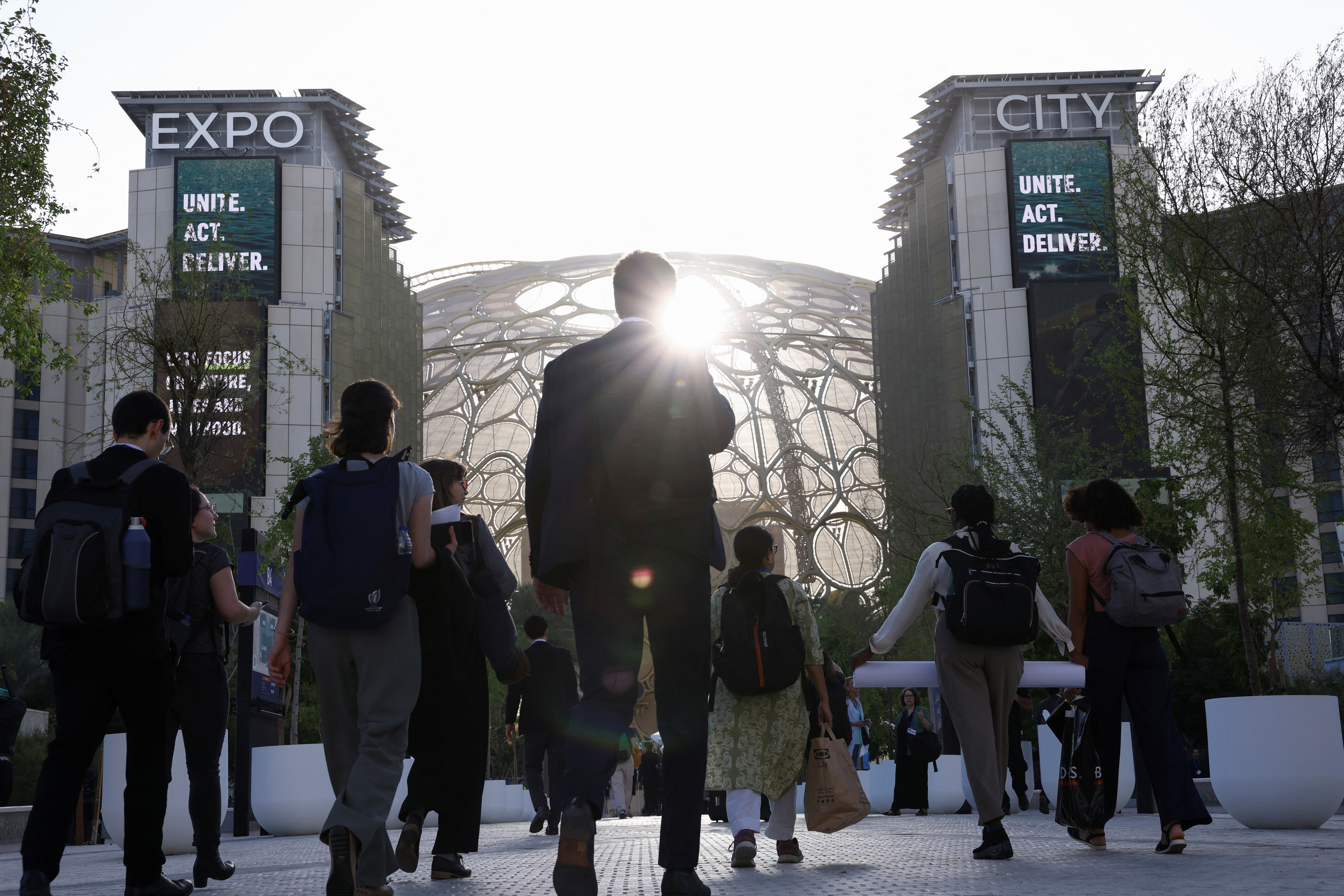COP28
By Kate Abnett, Maha El Dahan and Valerie Volcovici
November 30, 20236:25 AM EST
Updated an hour ago

Attendees arrive for the opening of U.N.'s COP28 climate summit in Dubai, United Arab Emirates, November 30, 2023. REUTERS/Amr Alfiky
Summary

Attendees arrive for the opening of U.N.'s COP28 climate summit in Dubai, United Arab Emirates, November 30, 2023. REUTERS/Amr Alfiky
Summary
- COP28 president says engaging on fossil fuels 'essential'
- Countries and oil companies urged to work together
- Summit delegates hope for early approval of disaster fund deal
DUBAI, Nov 30 (Reuters) - The incoming COP28 president, Sultan al-Jaber, opened this year's U.N. climate summit on Thursday by urging countries and fossil fuel companies to work together to meet global climate goals.
Governments are preparing for marathon negotiations on whether to agree, for the first time, to phase out the world's use of CO2-emitting coal, oil and gas, the main source of warming emissions.
Jaber, who is also the CEO of the United Arab Emirates' national oil company ADNOC, aimed to strike a conciliatory tone following months of criticism over his appointment at the head of COP28.
In his opening remarks, Jaber acknowledged that there were "strong views about the idea of including language on fossil fuels and renewables in the negotiated text. ... I ask you to work together."
"It is essential that no issue is left off the table. And yes, as I have been saying we must look for ways and ensure the inclusion of the role of fossil fuels."
He touted his country's decision to "proactively engage" with fossil fuel companies, and noted that many national oil companies had adopted net-zero targets for 2050.
"I am grateful that they have stepped up to join this game-changing journey," Jaber said. "But, I must say, it is not enough, and I know that they can do much more."
DISASTER FUND
As the U.N. climate conference kicked off, delegates were hoping to clinch an early victory on a disaster fund. The COP28 presidency published a proposal late Wednesday for countries to formally adopt the outlines of a new U.N. fund for poor countries being hit by climate disasters like extreme flooding or persistent drought.
An early breakthrough on the damage fund - which poorer nations have demanded for years - could help grease the wheels for other compromises to be made during the two-week summit.
Some diplomats said they hoped the draft deal for the fund would be approved quickly, with one delegate describing the possibility of objections at this point as "opening Pandora's box". The deal was crafted over many months of tough negotiations involving wealthy and developing countries.
Establishing the fund allows rich countries to begin pledging money for it, and nations including Germany, Denmark and the Netherlands are expected to announce contributions over the next few days, European diplomats told Reuters.
The European Union has pledged a "substantial" contribution, but wants countries whose economies have boomed in recent decades, like China and the UAE, to follow suit.
"Everyone with the ability to pay should contribute," said EU Climate Commissioner Wopke Hoekstra, who said he wanted to "broaden the donor base beyond the usual suspects, simply because that reflects the reality of 2023."
Adnan Amin, CEO of the COP28 summit, told Reuters this month the aim was to secure several hundred million U.S. dollars for the climate disaster fund during the event. He said he was "hopeful" that the UAE would make a contribution.
"We cannot rest until this fund is adequately financed and starts to actually alleviate the burden of vulnerable communities," said Samoa's Ambassador to Europe, Pa’olelei Luteru, who is also the chairman of the Association of Small Island States (AOSIS) negotiating bloc.
Another major task at the summit will be for countries to assess their progress in meeting global climate goals - chiefly the Paris Agreement goal of limiting global warming to well below 2 degrees Celsius (3.6 degrees Fahrenheit).
This process, known as the global stocktake, should yield a high-level plan telling countries what they need to do.
Reporting by Kate Abnett, Valerie Volcovici and Maha El Dahan; Writing by Katy Daigle; Editing by Matthew Lewis, Miral Fahmy and Christina Fincher
No comments:
Post a Comment